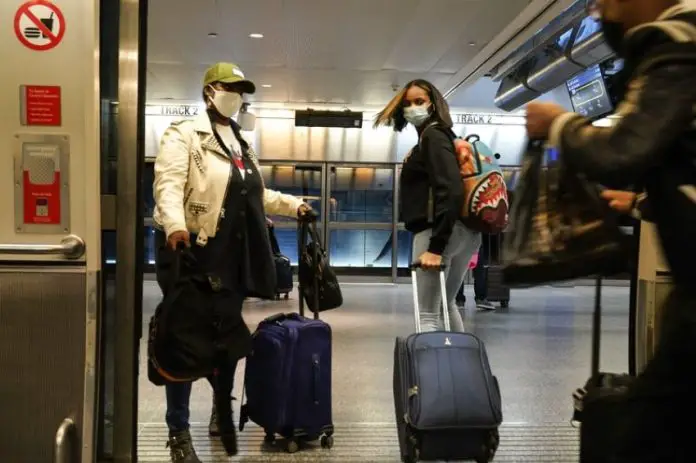As Thanksgiving in the U.S. approaches on November 26, I’ve been seeing articles, memes and viral tweets from desperate medical personnel across the country, all begging for the same thing: that their compatriots give up the cross-country trips for a big holiday meal this year in favor of small or even nonexistent get-togethers.
We’re still in the grips of a scary virus that has shown no sign of letting up, at least not in those countries that aren’t able to oblige their citizens to take absolutely every safety protocol seriously from the start. From the travel numbers, it looks like plenty of people are planning on ignoring this advice and traveling anyway. Some will do so with a tinge of guilt and try to make up for it with other safety measures: they’ll get tested before and after, wear masks, keep hand gel nearby and generally do their best to follow the CDC-recommended safety protocols.
What I’ve also seen are many hardcore safety enthusiasts — most of whom are upper-middle-class professionals who have been able to afford to stay at home and work from there — actively shaming those who opt for this plan. And I suppose that when you’ve got everything you need at home, including a supportive social circle, it’s very tempting to stay there.
Unfortunately, this “if-I-can-do-it-so-can-you” attitude, while appropriate for things like wearing masks, using gel and not standing 5 centimeters from someone else’s face, just sounds smug and mean when it morphs into “and, also, you’re basically killing people if you hang out with anyone outside of your household, so I hope you’re ready to live with that.”
I understand their concern, but really. I imagine that this attitude most likely causes the “offenders” to hide their behavior rather than stop it and risks the encroachment of what Dr. Susan Pierce Thompson calls the “what-the-hell effect,” which essentially translates to, “Well, it’s already broken; no use trying to stop breaking it now.”
As I wrote a few weeks ago, you simply can’t deny people their social needs indefinitely. We need each other because we just do … it’s the way the human brain stays healthy. Trying to shame people into avoiding all in-person interaction indefinitely is a losing game. It’s also important to remember that the situation for a family quarantined all together is going to be very different than that of a single person living alone, which I feel is something that certain safety enthusiasts simply fail to sympathize with.
When asked about the merits of testing before get-togethers, Dr. Anthony Fauci, head of the U.S. National Institute of Allergy and Infectious Diseases, told Elisabeth Rosenthal of the New York Times, “Don’t let the perfect be the enemy of the good. But the risk that you have, if everyone is tested before you get together to sit down for dinner, dramatically decreases. It might not ever be zero but, you know, we don’t live in a completely risk-free society.”
He’s got a point. After all, there are plenty of things we choose to do because we’ve determined that the risks are worth it (driving cars comes to mind). Just like seat belts reduce, but don’t eliminate, our chances of dying in a car accident, masks, handwashing and maintaining physical distance in well-ventilated areas all help reduce the risk of spreading the virus.
There are plenty of other people in my home country, of course, who still believe that Covid-19 is either a hoax or 100% overblown even as the coronavirus picks off those around them. They will celebrate Thanksgiving as if the pandemic didn’t exist, and unfortunately many will suffer the consequences of that failure to take any precautions.
After all, you don’t have to believe in the virus. But the virus sure does believe in you.
I like Dr. Fauci’s realistic perspective, and from my perch in Mexico observing my home country from afar, I think I’m better off waiting out the pandemic down here than I am up there.
Because while I’ve certainly encountered people here who don’t think it’s a big deal — take Mexico’s president at the start of the pandemic, for example — most do seem at least to be moved by evidence. I’m especially grateful that wearing a mask and taking precautions doesn’t seem to be a political issue. People that don’t do it are probably just being plain-old inconsiderate rather than defiant. At the very least, leaving one’s mask at home here is not done for the specific purpose of getting a rise out of bothering other people. And for that, I am thankful.
I wrote last week in my personal blog that the message from the universe seems to be this: “Just wait a little longer.”
“We’ll have a vaccine, but not yet.”
“You’ll have a new president, but not yet.”
“You need to suffer, hard, a bit more, but look, there’s an end in sight; it’s blurry and we can’t say exactly where it is, but you can see it all the same. Hold on a little more.”
So let’s try to give thanks. If you need to shake your fists at the gods, go for it; I’m sure they can take it. And for those of you celebrating Thanksgiving in this beautiful adopted country, don’t forget to send up a prayer of thanks that you’re living in a culture that, at least on the issue of virus safety, isn’t as crazy-town about it as its neighbor to the north.
Sarah DeVries is a writer and translator based in Xalapa, Veracruz. She can be reached through her website, sdevrieswritingandtranslating.com.
